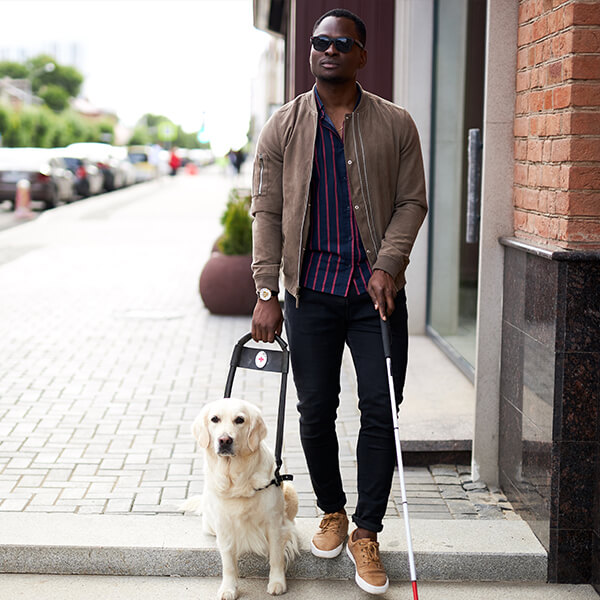Dogs have an extraordinary ability to enhance our lives in countless ways, serving as loyal companions, sources of comfort, and even as invaluable assistants in daily tasks. In particular, assisted therapy dogs play a vital role in providing support to individuals facing physical, emotional, or cognitive challenges. Through their unwavering loyalty and affection, these remarkable animals contribute to the well-being and quality of life of those they serve.
The Power of Assisted Therapy Dogs:
Assisted therapy dogs, trained to provide therapeutic support to individuals in need, offer a myriad of benefits that improves both physical and mental health. For individuals’ disabilities, therapy dogs can assist with mobility, rehabilitation, and sensory stimulation, thereby improving overall physical function and independence. Moreover, the presence of a therapy dog has proven to reduce stress levels, depression and anxiety while promoting relaxation and boosting mood, making them invaluable allies in the realm of mental health and emotional well-being.
One need only hear the heartwarming stories of individuals whose lives have been changed by the companionship and assistance of therapy dogs to understand the profound impact these animals can have. From helping a child with autism navigate social interactions to providing comfort and companionship to elderly individuals in nursing homes, the therapeutic benefits of assisted therapy dogs are truly remarkable.

Common Breeds of Assisted Therapy Dogs:
Golden Retriever: Renowned for their gentle temperament, intelligence, and innate desire to please, Golden Retrievers are frequently chosen as therapy dogs. Their friendly personality and ability to connect with people of all ages make them ideal companions for individuals in need of emotional support or assistance.
Labrador Retriever: Labrador Retrievers are another popular choice for therapy work due to their affable nature, trainability, and versatility. Their outgoing personalities and ability to engage with humans make them well-suited for tasks such as guiding individuals with visual impairments or providing comfort in therapeutic settings.
German Shepherd: Known for their loyalty, intelligence, and protective instincts, German Shepherds are often employed as service dogs in various capacities, including assisting individuals with physical disabilities or providing emotional support in therapy settings. Their natural aptitude for obedience training and strong bond with their handlers make them valuable assets in the field of assisted therapy.
Poodle: Poodles are highly regarded for their intelligence, hypoallergenic coat, and gentle demeanour, making them excellent candidates for therapy work. Standard, Miniature, and Toy Poodles are all utilised in therapy programs, where their calm and patient demeanour can provide comfort and companionship to individuals in need.
Cavalier King Charles Spaniel: Based on their affectionate nature, friendly disposition, and small size, Cavalier King Charles Spaniels are well-suited for providing emotional support and companionship to individuals in various therapeutic settings. Their gentle demeanour and adaptable nature make them cherished therapy companions.
Acquiring an Assisted Therapy Dog:
Individuals interested in acquiring a therapy dog have several avenues to explore. One option is to contact certified therapy dog organisations that specialise in training and certifying therapy dogs. These organisations often have specific requirements for both dogs and handlers and can provide guidance on the process of obtaining and training a therapy dog. Alternatively, individuals can investigate local therapy dog programs or facilities in their area that utilise therapy dogs in therapeutic settings. These programs may offer opportunities for volunteer work or provide information on how to become involved with therapy dog teams. For those who already have a dog with the appropriate temperament and disposition, training them for therapy work is another possibility. Enrolling in obedience classes, pursuing specialised training for therapy work, and seeking guidance from experienced trainers or organisations can help prepare a dog for its role as an assisted therapy dog. Additionally, some organisations may have trained therapy dogs available for adoption or placement with individuals in need, offering a rewarding option for those seeking a companion with prior training and experience in therapy work.
Helpful Dog Products for Daily Living:
In addition to the invaluable support provided by therapy dogs themselves, a range of helpful dog products further enhances the daily lives of individuals with diverse needs. At Tenura Daily Living Aids, our products are designed to promote safety, accessibility, and independence, not only for humans but for their canine companions as well. For example, our Extreme Grip Mats and Non-Slip Table Mats are not only perfect for securing household items, but they also keep dog bowls firmly in place, preventing spills and messes during meal times.
From mobility assistance products such as harnesses and lifting aids to emotional support tools like calming vests and interactive toys, there are countless innovations aimed at improving the lives of both dogs and their human counterparts. Training aids, communication tools, and safety products further contribute to the well-being and safety of individuals living with assistance dogs.
 What is the Difference Between a Support Dog and an Assistance Dog?
What is the Difference Between a Support Dog and an Assistance Dog?
In essence, the difference between a support dog and an assistance dog lies in their roles and training. A support dog, also known as an emotional support animal (ESA), offers comfort and companionship to individuals with mental health conditions without requiring specialised training. Conversely, an assistance dog, commonly referred to as a service dog, undergoes rigorous training to perform specific tasks or assist individuals with disabilities in their daily activities. While support dogs focus on providing emotional support, assistance dogs are trained to perform tasks such as guiding individuals with visual impairments, alerting those with hearing impairments, or providing physical assistance for mobility, thereby enabling greater independence for their handlers.
The bond between humans and dogs is one of profound mutual benefit, characterised by companionship, support, and unwavering loyalty. Assisted therapy dogs, alongside helpful dog products, play a pivotal role in enhancing daily living for individuals facing a range of challenges. Through their presence, companionship, and specialised training, these remarkable animals bring comfort, joy, and independence to those they serve, enriching lives in ways that are truly immeasurable.
We invite you to share your own experiences with therapy dogs or to explore the possibilities of integrating these remarkable animals into your life. For more information about Tenura Daily Living Aids and our range of helpful products for pets and humans alike, visit our website or connect with us on social media. Together, let's celebrate the transformative power of assisted therapy dogs and the invaluable contributions they make to our lives every day.